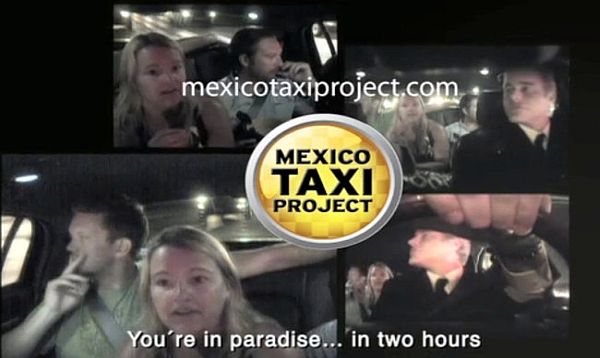Campaigns that feature hidden-camera commercials are popular among marketers seeking to change perceptions about products because they offer consumers a chance to watch other consumers share candid opinions. Examples include spots for Folgers instant coffee,Burger King, Pizza Hut and Ford Motor.
Beginning on Friday, there will be another arrival amid their ranks: Mexico, which is seeking to change perceptions about conditions that tourists find there. The commercials are part of a campaign for the Mexico Tourism Board, with a budget estimated at more than $30 million, that is to run in major cities. The campaign also includes online and print advertising.
The commercials blend trappings of hidden-camera spots with elements of the HBO series "Taxicab Confessions." To underline the mash-up, the campaign is called the "Mexico Taxi Project," a title that is echoed in the address of a microsite, or special Web site, at MexicoTaxiProject.com.
The microsite will include the commercials and what is described as the unedited film from which the commercials are being created.
In the commercials, tourists returning from Mexico chat about their trips with drivers from car services who are taking them home. The drivers were, of course, part of the campaign, as were the town cars equipped with hidden cameras that filmed the rides from airports in markets like Chicago, Los Angeles and Philadelphia.
In one commercial, the driver asks his passengers, two men and a woman who have returned from a vacation in Cabo San Lucas, "Oh, and did you guys feel like safe and everything down there?" One man replies, "Oh yeah," adding, "We almost didn’t go." The second man replies, "Totally safe." And the woman says of visiting Mexico: "I would definitely recommend it. Everything you hear on the news is not what you experience down there."
In another commercial, a man and a woman praise the proximity of Mexico ("only a two-hour plane ride"), the food ("fantastic") and the atmosphere ("really cool"). Although the spot does not directly address issues like safety, the man says, "I’ve never been more relaxed in my life" and the woman chimes in, "Yeah, it was an awesome vacation."
The campaign will be accompanied by ads that take a traditional tack, promoting attractions like Cancún and Puerto Vallarta. But the tourism board intends to play up the "Mexico Taxi Project" as a way to counter potential problems with wooing travelers to Mexico.
"It is a gamble, I have to admit it," said Gerardo Llanes, chief marketing officer at the Mexico Tourism Board in Mexico City. "We felt strongly that Americans talking to Americans about their experiences in Mexico would be stronger than a feel-good commercial," he added, or "an institution like the Mexico Tourism Board talking."
The decision to try hidden-camera commercials was backed by "a lot of research," Mr. Llanes said, showing that most of "the tourists who come to Mexico would recommend Mexico as a destination to friends and family."
Another point of support from the research was that "we have a lot of repeat purchase," he added, borrowing a term from product marketing, which buttressed a belief that many tourists speaking for the hidden cameras would offer positive comments.
"We take the chance" of filming the visitors "because we know how satisfied people are," Mr. Llanes said. "The chances of negatives are so small."
The Mexico commercials, like other spots in the hidden-camera genre, required considerable logistical set-ups. Tourists were approached at airports in Mexico, Mr. Llanes said, and again after they landed at their home airports. They were told initially that their opinions were being sought "for a new brand of tequila," he added, and for cooperating they would receive free rides home; selected town cars were equipped with cameras.
The drivers had to be familiar with the cities in which they were driving, Mr. Llanes said, so passengers would not become suspicious. Those the tourism board wanted to appear in commercials were asked to sign waivers, he added, and so far none have declined. It was important for the conversations to take place once the visitors were home, he said, because if they were filmed in Mexico they might have felt they would "have to be nice and polite."
He offered this comparison: "If I go to your house and don’t like the furniture, I wouldn’t say it."
The campaign idea came from the Mexico City office of Publicis Worldwide, part of the Publicis Groupe, and is its first work for the tourism board.
"We knew that nine out of every 10 visitors leave with very high levels of satisfaction," said Alejandro Cardoso, president at Publicis Mexico and chief executive at Publicis Latin America, and many visitors "repeat their vacations, their holidays, throughout their lifetimes. But we thought there was one part of the equation missing," he added. "How could we create positive conversations about Mexico that would become viral?"
The way would be "not Mexico talking about itself," Mr. Cardoso said, but rather the tourists themselves starting the conversations. "We knew there was a risk," he added, but the commercials filmed so far have been "a reconfirmation of what we knew would happen."
There will also be versions of the commercials for Canada.
The microsite is being handled by the Mexico City office of Havas Digital, part of Havas, and the media part of the campaign is being handled by the Mexico City office of another Havas agency, MPG. Ogilvy Public Relations Worldwide, part of the Ogilvy & Mather Worldwide division of WPP, handles public relations for the tourism board.
Did any of the agencies think to serve the tourists in the back seats of the town cars cups of Folgers or Whoppers?
A version of this article appeared in print on November 3, 2011, on page B3 of the New York edition with the headline: Trying to Alter Perceptions, Mexico Uses Candid Chitchat.


